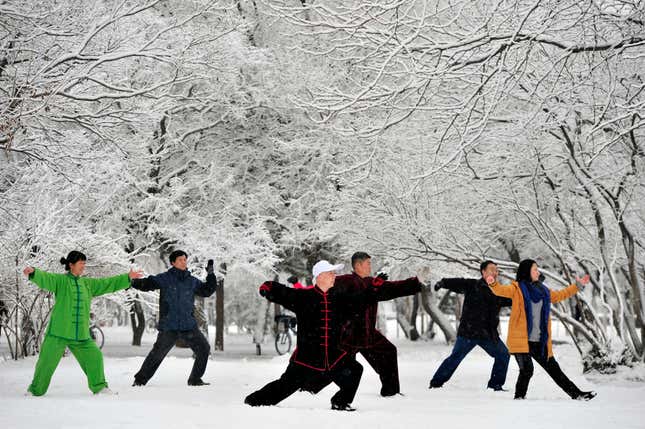A few weeks ago, a photo of city workers in a city in eastern China doing push-ups as punishment made the social media rounds (link in Chinese). Employees exercising collectively at the boss’s orders is an important part of the landscape of work in contemporary China—but rather than a penalty, it’s used far more often as a tool to boost team spirit.
Walk by a bank early in the morning, and it’s possible to see uniformed tellers inside being led through a calisthenics routine before the branch opens for business. Employees of many barber shops, beauty salons, restaurants, hotels also start the day with a routine like that. It’s even part of the corporate culture of some big Chinese companies, according to Colin Hawes, a professor on the law faculty at Australia’s University of Technology Sydney, who wrote about the practice in his book, The Chinese Transformation of Corporate Culture (pdf).
“I would say it is one of several different kinds of ‘morning rituals’ that Chinese companies have introduced over the past decade or so to try and create a sense of belonging among their employees… and to act as a kind of daily psychological transition from their personal lives to the company work day,” Hawes told Quartz via email. “These morning rituals may involve aerobic-type warm-ups or synchronized dances set to music, but just as commonly, they may involve lining up in work groups and listening to a pep talk.”
Once, says Hawes, he saw employees outside one restaurant playing a tag-like game in a circle.
Perhaps the most famous example is a video of a hotel’s morning exercise routine that first spread like wildfire in China four years ago, and continues to resurface on the Chinese net.
“What’s our slogan?” shouts a woman, leading the session. “We are the strongest! We are the best!” Lines of hotel maids in shipshape red uniforms stamp their right feet and flap their forearms up and down energetically. The slogan shouting becomes louder and louder, faster and faster, until no one can catch up. “Ok, stop!” shouts the woman again.
While the practice in corporate and office settings first became more noticeable a decade ago, its roots are far older, and combine both China’s long tradition of collective exercise—people doing tai chi outdoors together is a common sight across cities—and the moral fiber-building efforts of early revolutionary mass mobilizations.
Soon after its establishment as a communist republic, the nation began exercising along to radio cues from 1951. Exercising together was seen as particularly important in times of national stress, for example during the Cultural Revolution. At that time, students would shout slogans like (link in Chinese): “Great leader Chairman Mao teaches us: Develop sports! Enhance people’s health! Be alert and protect our motherland!”
The official exercises were updated in 2011 (video).

In secondary school, Chinese students still participate in call-and-response routines while running in lines. Classrooms compete to see who can shout their class slogan the loudest and run in the straightest lines. University life also begins with a two-week period of military training based on the idea that this will promote student discipline. It’s the same idea that inspires Chinese companies to start the day by getting employees to chant slogans like “We will always win!”
The phenomenon does sometimes arouse the grumbling of both people doing it and people watching it. “One word to describe what onlookers think about it: stupid!” wrote one user on Zhihu, a Quora-like Q&A site (link in Chinese).
Some citizens have called their local urban management offices (in Chinese) to complain about the noise caused by some establishments’ morning routines. And a British tabloid recently suggested time theft might be at play, noting in a report on a footwear company that employees spend 1.5 hours a week singing the company song and attending a pre-work meeting. The company, Apache Footwear, couldn’t be reached for comment.
The manager of a branch of a popular hair salon that has been doing a morning routine since it opened in 2008 says he does think it’s a good way to start the day.
“The first thing, of course, is to keep them fit and get a little stretch. The second is to increase their motivation. We call out ‘cheer up’ to encourage each other,” says Li Yuqiu, manager of a branch of the Shuilinglong salon in Changsha, Hunan Province. However, he adds that over time the routine, which at one point took up to half an hour, has been shortened in order to pacify reluctant employees.
Due to an editing error, an earlier version of this post incorrectly attributed a social media quote to a user on Guokr instead of Zhihu.
